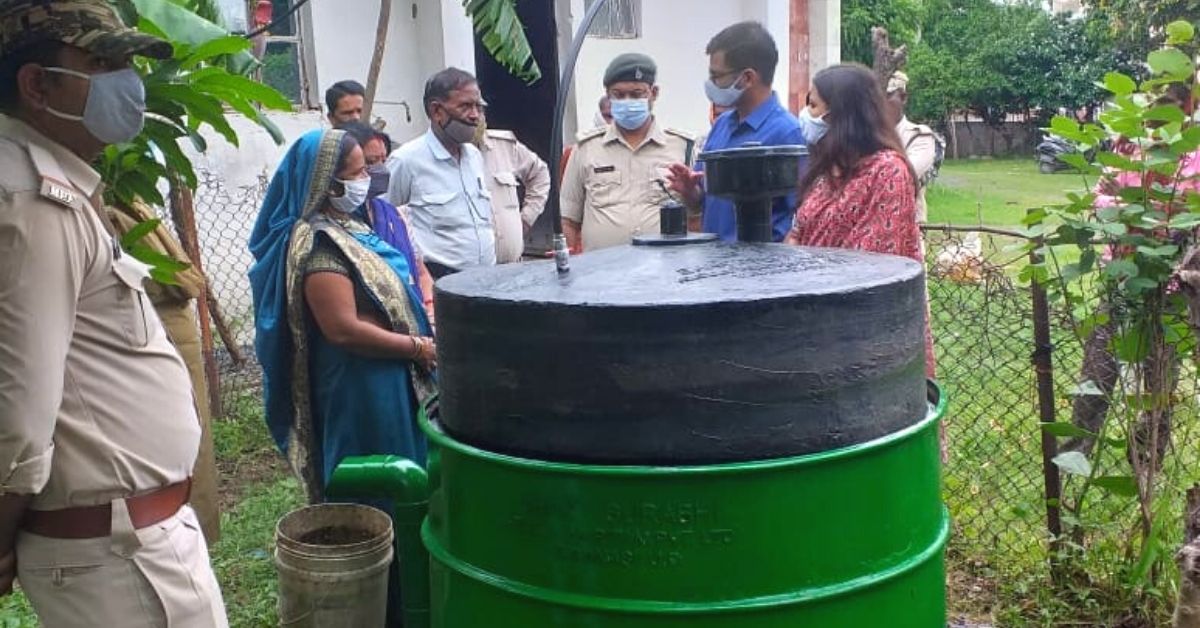In June and July 2020, the forest department of Maihar region in Madhya Pradesh held the annual drive of planting 4.7 lakh tree saplings. Soon after the drive was over, Indian Forest Service (IFS) officer Anupam Sharma visited the area for inspection.
Here, the sight of low-density polyethene (LDPE) plastic bags littered across the area left him aghast. “The forest department had planted about five lakh saplings, and each of them came wrapped with a plastic bag. On one hand, we were working towards the cause of the environment, while on the other, about 5,000 kilos of plastic waste had accumulated because of us, with no legitimate way of managing it,” he tells The Better India.
Anupam, posted as trainee sub-divisional officer, says that if left unchecked, plastic waste pollutes and causes damage to the environment for years.
Helping hand from the other half

He tried reaching out to the local civic body, but they refused to buy the waste, nor had the required facility to treat it. “I had doubts about the incineration techniques and did not give the waste for burning, as this could cause air pollution. I even tried to explore setting up a unit that converts plastic waste into granules, which could offer employment opportunities to the villagers falling under the Joint Forest Management Committee (JFMC). But the prospect was unfeasible for economic reasons,” Anupam recalls.
A little more research on plastic waste mitigation led him to a scrap dealer, who agreed to buy the waste at Rs 12 per kilo and ensure that it reaches recycling plants in Indore and Jabalpur.
However, there was a condition. “The plastic waste needed to be cleaned to get the best rates possible. To ensure the same, the department conducted a demonstration to clean the plastic by rubbing off the soil, removing pebbles, twigs and other waste by washing,” Anupam says, adding that the department earned Rs 59,000 from the scrape sale.
Anupam adds, “The carbon footprint of LDPE plastic is about 6kg CO2 behind every kilo of plastic. Thus, this initiative has effectively prevented around 30,000 kilos of CO2 emission.”
But Anupam did not know how the money could be utilised for a social cause. So he approached his wife, Bhavna, a solid waste management expert, to seek solutions.
“It was she who had guided me in terms of using the money to benefit the villagers,” he says.
Bhavna suggested setting up a biogas plant at an old-age-home, installing an oil presser machine and a spice grinder unit. The aim was to help create employment opportunities for the villagers. “We procured the units at subsidised rates, and this allowed us to lower purchase costs to almost 50 per cent,” she tells The Better India.
The biogas plant helps serve some needs of the Maa Sharada Devi Temple Management Committee’s Old-Age Home.
Gaurishankar Mishra, manager at the old-age-home, says, “The biogas plant helps prepare morning and evening tea for the residents, and also helps mitigate wet waste generated on the premises. We plan to increase the usage of the plant to make breakfast once the production of gas becomes consistent.”
An environment-friendly model

Anupam says the oil pressing unit processes 4 to 8-kilo oilseeds per hour and is operated by the Bareh Bada village JFMC. “The villagers received the required training to extract oils from groundnut, linseed, mustard, sesame, soybean and forest-based oilseeds like Karanj, Mahua, Neem, among others. The leftover residue from the oilseeds gets used as a supplement for the cattle feed,” he adds.
He says that the grinder can grind 500 grams of spice per day and soon will be used by Tala village JFMC. “The unit will be used to make spices like cloves, black pepper, cinnamon, turmeric, chilli, coriander, cardamom, fenugreek and other Ayurvedic powders,” he says.
Anupam says the various initiatives have helped prevent plastic waste from entering landfills and provided sustainable employment opportunities for the villagers.
He adds, “There are millions of trees planted across the country every year, and the cumulative effect of the untreated plastic from tree plantation drives can have vast detrimental effects on the environment. Such waste management models can make tree plantation drives environment friendly in the true sense.”
Edited by Divya Sethu
No comments:
Post a Comment